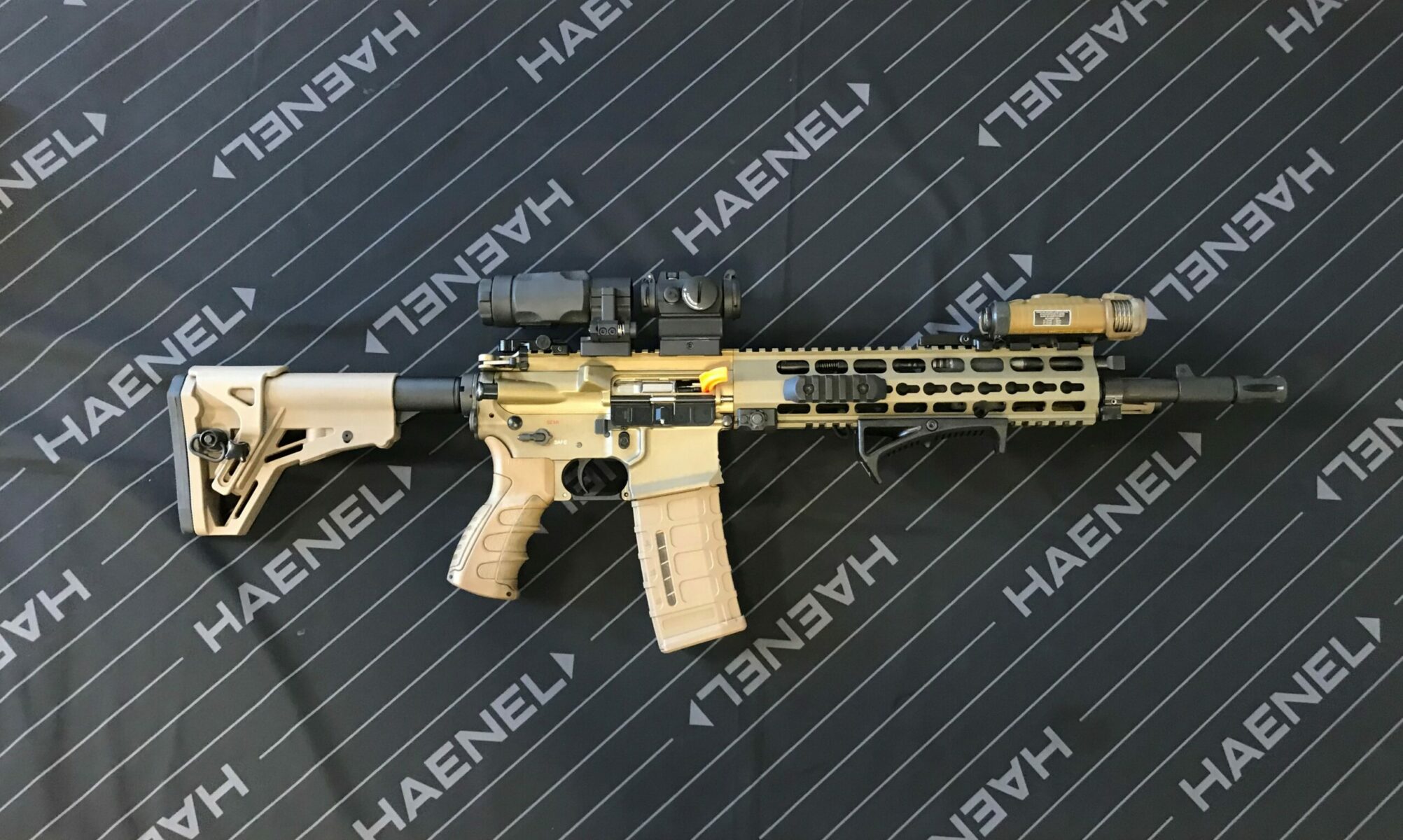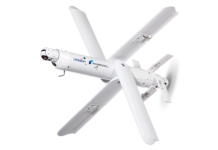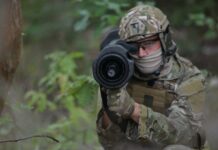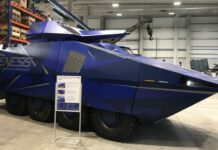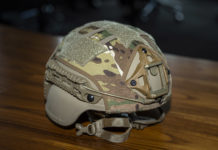Based in Suhl in the German state of Thuringia, small-arms manufacturer C.G. Haenel still thinks it has a good chance that the MK556 will be the Bundeswehr’s future assault rifle. The company is still fighting for the contract, which was withdrawn from the company after it was awarded last September. Three lawsuits are currently pending before German courts. At the same time, the company is defending itself against what it sees as false claims still circulating around the ownership structure and performance of the company.
“We can only win,” said Olaf Sauer, Haenel’s managing director, on the current state of affairs during a factory visit. Sauer answered the question of whether the company still expects the Bundeswehr to award the contract to Haenel at all, even if the Courts should rule in favour of the Thuringian company next spring, as follows: “For Haenel it is important to show that we have not made any mistakes. We cannot influence anything else.”
The company is not only fighting for the order for up to 120,000 assault rifles, but also for its reputation. Therefore, it has decided to refute all unjustified accusations with all available legal means, Sauer said in an interview with our German sister website Soldat & Technik.
Patent Infringements and Profitability
For several months, the company has been involved in several legal disputes, which have not yet been finally resolved. After the Bundeswehr excluded C.G. Haenel from the award procedure at the beginning of March 2021, citing possible patent infringements, the company took legal action: after a reprimand was rejected by the Bundeswehr procurement authorities (German abbreviation: BAAINBw), the company filed a complaint with the Federal Cartel Office in Bonn. The Public Procurement Chamber there rejected the complaint on June 10th. The reasoning surprised not only observers of the tender but also the company itself. Patent infringements – the original reason for the exclusion – no longer played a role. Two weeks before the oral hearing, the Thuringians were told by the Bundeswehr lawyers that the offer was no longer the most economical, i.e. too expensive.
The reason given by the Cartel Office was that the price clarification initiated by the BAAINBw after the final bids had been submitted was unlawful. This had led to a change in the order in which the bids were evaluated.
The background to this justification was that the two bidders had quoted significantly different prices for so-called STANAG rails (often also referred to as Picatinny rails), which are used to attach peripheral equipment to the assault rifles. The Bundeswehr procurers then contacted the companies and asked for clarification on this point. Haenel then informed them that the price quoted referred to a set of three rails, while Heckler & Koch had quoted the price for individual rails. This so-called clarification led to the Thuringian offer being classified as the more economical one.
According to the Haenel management, the company responded as requested to an enquiry from the customer. In the original offer, one had “thought in sets”, since “from C.G. Haenel’s point of view, three rails are necessary for the functionality of the gun with all required attachments”, Sauer explains. Although the decision of the Cartel Office was noted, it was not accepted and therefore an appeal was filed with the responsible Higher Regional Court in Düsseldorf (OLG).

The decision of the Bonn judges is not uncontroversial even among public procurement law experts. Daniel Soudry, specialist lawyer for public procurement law and partner in the Berlin law firm Soudry & Soudry, explained in the August issue of the trade journal Europäische Sicherheit & Technik that according to the legal situation in Germany, price information in tenders that is essential may not be demanded. Soudry: “It is only unclear whether prices were demanded at all in this case: The procedure of the contracting authority – the request to all bidders to review and, if necessary, revise their bids – looks more like a partial reversal of the award procedure. It allows the contracting authority to clarify its unclear documents and remove doubts. In addition, all bidders, not just individual ones, are allowed to improve their bids – with an open outcome. In this case, however, the situation of renegotiating individual bids, which is rightly regarded as non-transparent and discriminatory, does not exist. And then the question of whether the priority order of bidders is changed when a new bid is submitted is no longer relevant”.
Bundeswehr Sees no Patent Infringements
The company expects the matter to be heard by the OLG in March 2022. Then there will probably be a decision on whether the demand was permissible. Possible patent law infringements will not play a role in this context, because the Bundeswehr’s lawyers seem to have changed their view on this as well. According to Sauer, the Bundeswehr has informed C.G. Haenel that possible patent infringements are not to be assumed anymore.
Originally, experts commissioned by the Bundeswehr had come to the conclusion that patent infringements could exist. Two aspects were considered: Bores for water drainage in a weapon component from C.G. Haenel, which could have infringed a Heckler & Koch patent, and a magazine supplied by the Bavarian manufacturer Oberland Arms, which could have infringed patents of the US manufacturer Magpul.
Bores
In the case of the bores, Haenel feels that the company has been unlawfully accused and that this view has been confirmed by an expert opinion commissioned by Haenel with an independent patent rights expert. After all, according to the company, the MK556 was a weapon entered into the competition with only one water drainage bore.
This design feature was first used in this form in 1994 by the US company Colt in the then Colt M4. Haenel boss Sauer says that Colt has confirmed in writing that Haenel does not infringe any patents. Although Heckler & Koch has filed a lawsuit against C.G. Haenel for the use of the same weapon component with three bore holes, this does not refer to the MK556 offered to the Bundeswehr, but to the CR223 – a civilian version of the rifle. According to Sauer, there has also been no extension action on the part of Heckler & Koch on the MK556, after the court dealing with this matter had looked at both weapons. In his opinion, this is a clear indication that the MK556 does not infringe on Heckler & Koch patents.
Magazines
According to Sauer, the allegations regarding the magazines have also been cleared up. The magazines submitted in the original competition had been obtained from the supplier Oberland Arms. These magazines are adapted to the Haenel gun, branded with the CARACAL logo and have been manufactured in Germany for several years by Oberland Arms in consultation with Magpul. According to Sauer, the new management of Magpul has in the meantime asked Oberland Arms to no longer offer this design without control from Magpul. As a result, C.G. Haenel, together with Oberland Arms, obtained written permission from Magpul to continue offering the magazines in their original form for a possible Bundeswehr order. According to Sauer, Magpul did not take any legal action against Oberland Arms.
Ownership Relations under Criticism
In addition to clarifying the legal issues, Haenel also wants to correct publicly made allegations about the company with the greatest possible transparency after the selection decision for Haenel, which was announced in September 2020 and came as a surprise to many.
After the Bundeswehr’s intention to commission C.G. Haenel with the delivery of the new assault rifles became known, objections to this intention were raised both in the media and from the political arena. Among other things, the ownership structure was criticised, since Merkel Jagd- und Sportwaffen GmbH, the parent company of C.G. Haenel, is a wholly owned subsidiary of the Arab arms manufacturer Caracal LLC. Caracal, in turn, is a subsidiary of EDGE, a technology group based in the Emirate of Abu Dhabi. Fears have been expressed that German know-how could flow into the Emirates and that weapons could be used for human rights violations.
For Haenel’s managing director, these accusations are pointless, as according to him they neither correspond to the facts nor have they affected the Bundeswehr tender in any way. For example, the ownership structure has been public knowledge since the end of the 2000s and played no role in the tender. Nor did they play a role in previous tenders. For example, C.G. Haenel was awarded the contract to supply the G29 special forces sniper rifle to the Bundeswehr almost half a decade ago.
Sauer says he is “happy about the shareholders who provide support in all kinds of ways”. They have long-term interests and are not interested in short-term profits, but in a “sustainable development” of the company. This is also evident from the fact that the shareholders have invested a lot of money in the site and have not made any financial withdrawals.
According to the managing director, the company is self-sufficient in its management decisions; the “shareholders only want to understand what we are doing”. There are also no delivery obligations or relationships to Abu Dhabi. “There is no technology transfer”. Sauer points out that Haenel is subject to German export regulations and only supplies European countries and NATO member states – but not all of them.
Production Capacities
There has also been criticism of the company’s small size and lack of production capacity. The company contradicts this and is therefore opening its production halls to dispel the accusation. The company’s management points out that the company has both sufficient expertise and sufficient production capacities to be able to serve the large-volume Bundeswehr order without having to neglect the currently dominant private customer business. “The private customer business is a stabiliser, we are not letting that go,” Sauer emphasises.
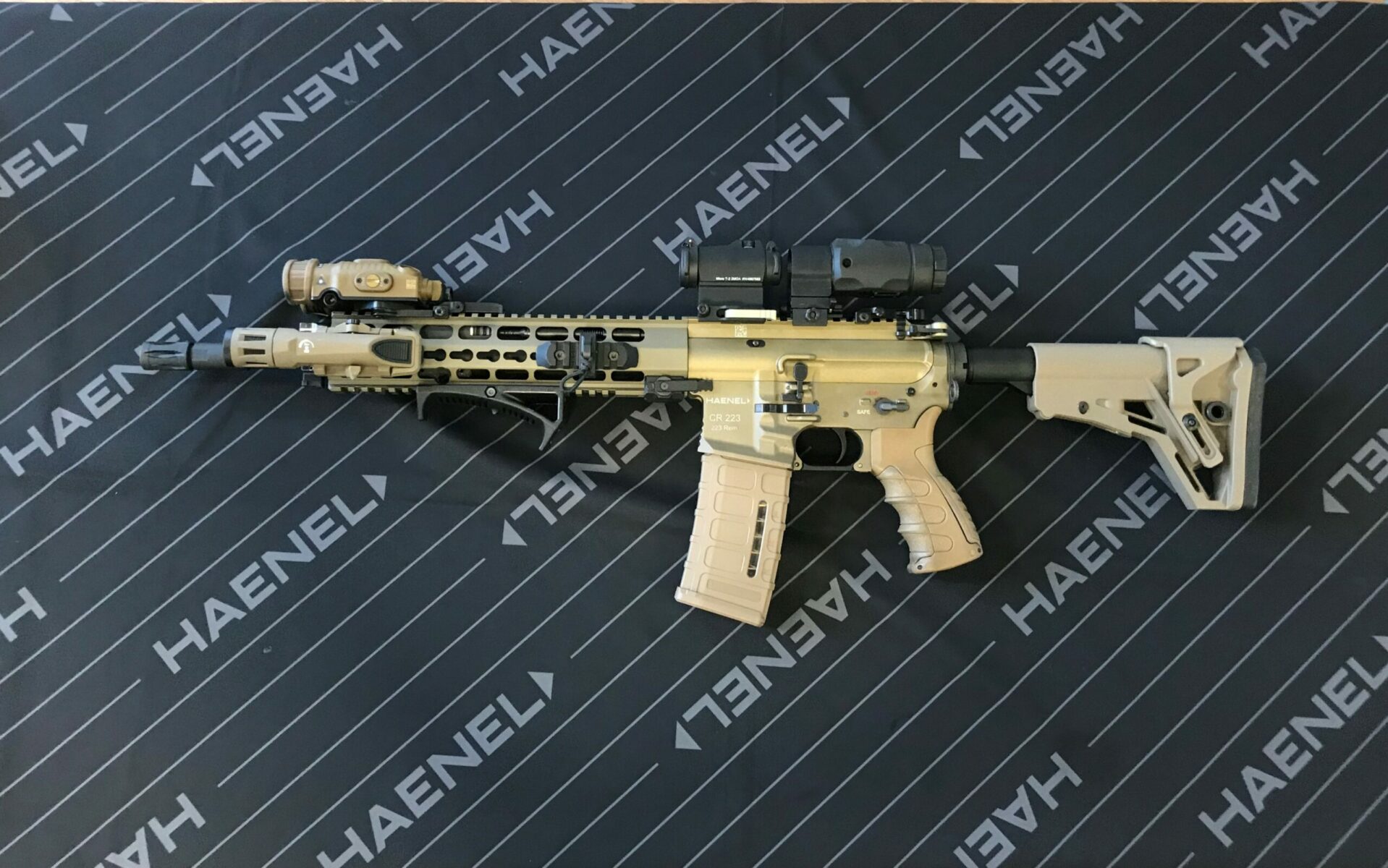
The managing director is proud of the company’s know-how in metal processing. This has been available for decades, since all Kalashnikov assault rifles used in the former German Democratic Republic had barrels made in Suhl. According to Sauer, Haenel has also mastered the technology surrounding the MK556, as the related civilian version of the assault rifle has already been in series production for almost half a decade.
However, production is not carried out by Haenel, but by parent company Merkel. The latter has the complete production capacities and supplies the three wholly-owned subsidiaries, which serve the three business segments of premium hunting weapons, hunting and shooting sports, and government and military business.
As far as production capacities are concerned, there are sufficient reserves in Suhl, says Sauer. This also becomes clear during the tour of the production facility. Production is currently “migratory”. This means that a skilled worker carries out production steps on a workpiece at several workplaces. This is because not every workstation and every workbench is occupied at all times, but is used by the staff for the respective work steps. The staff therefore move from workstation to workstation. According to Sauer, this can be scaled up even further by permanently staffing the production stations. In this way, the company has sufficient growth potential without having to expand.
According to Haenel, the machine capacities are also far from being exhausted. In barrel production, for example, only about 50 per cent of the total capacity is used, half of which is used to produce barrels for competitors. Sauer says it currently produces about 25,000 barrels a year. 60,000 are possible if several shifts are run. To put this into perspective: according to the published Bundeswehr figures, the company would have to deliver up to 20,000 rifles annually for the Bundeswehr contract.
Haenel’s management emphasises that it is constantly investing in the expansion and modernisation of its machinery. Not only to expand capacities, but also to increase product and production quality and to be able to offer the workforce an attractive workplace. This has contributed to the fact that, despite the shortage of skilled workers in Germany, it has been possible to fill the positions of employees who have retired.
In this context, the managing director refers to the high level of qualification of his staff, of which only a low single-digit percentage is unskilled. According to him, this is due on the one hand to the in-house training and further education company and on the other hand to the Suhl location, where there is one of two training centres for gunsmiths in Germany. Although he admits that his company cannot escape the competition for skilled workers, he believes that he will be able to recruit enough qualified staff in the future.
Author: Waldemar Geiger is publisher of the German language defence website Soldat & Technik.


